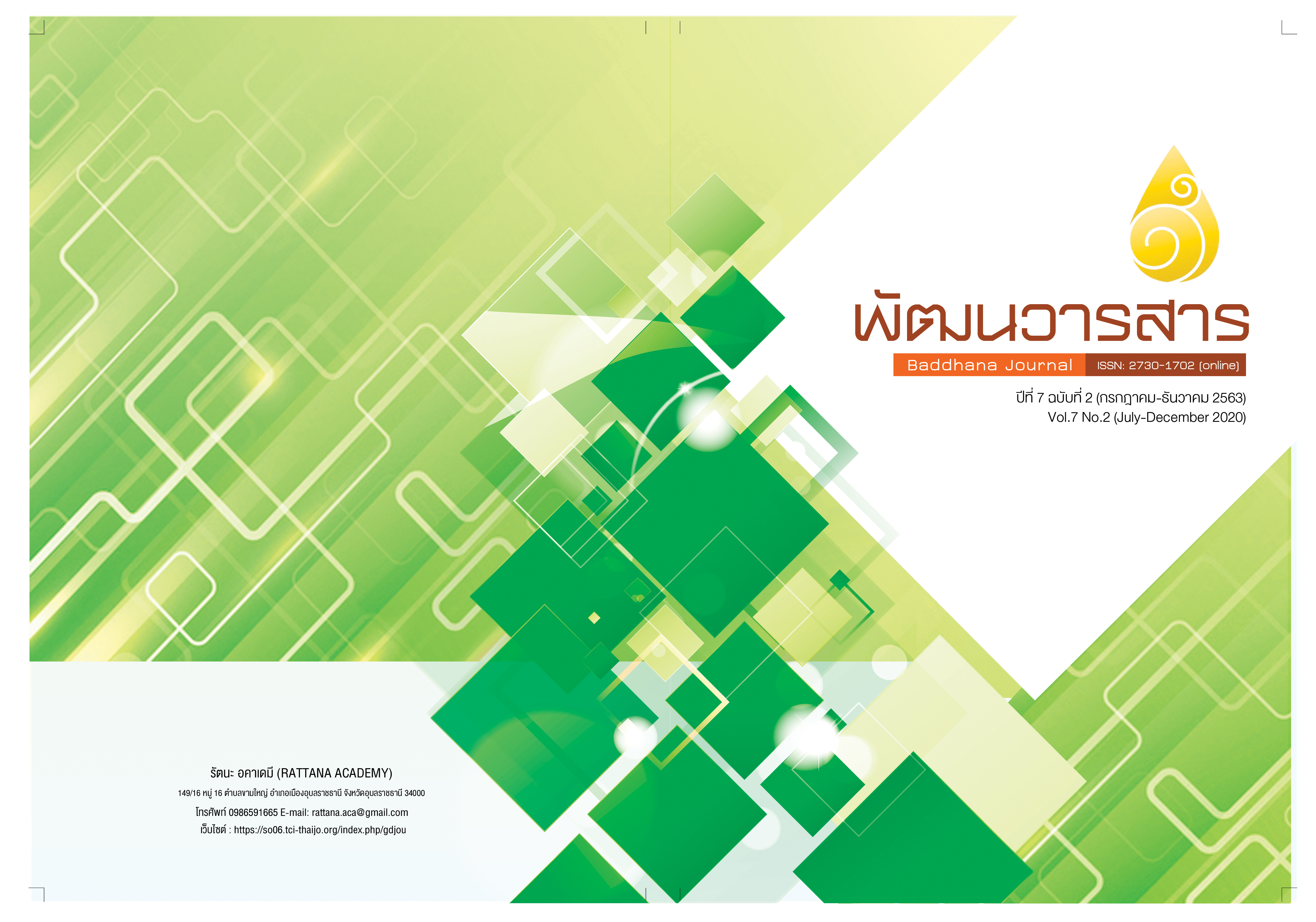THE INSTRUCTIONAL LEADERSHIP OF SCHOOL ADMINISTRATORS AFFECTING THE PROFESSIONAL LEARNING COMMUNITY OF SCHOOLS UNDER THE OFFICE OF UDON THANI PRIMARY EDUCATIONAL SERVICE AREA
Main Article Content
Abstract
The purposes of this research were to 1) study the professional learning community of the schools 2) study the instructional leadership of school administrators 3) study the relationship between instructional leadership of school administrators and the Professional Learning Community of the school, and 4) create a forecast of the school's Professional Learning Community under the office of Udon Thani primary educational service area. The samples were 330 teachers in the schools under the office of primary educational service area using stratified random sampling. The research instrument used in the research was a 5 rating scales questionnaire with the riliabilities of .982 and .979 respectively. The statistics used for data analysis were frequency, percentage, mean, standard deviation, Pearson's product moment correlation coefficient, and stepwise multiple regression analysis The results of the research showed that 1. The professional learning community of school under the office of Udon Thani primary education service area was at the high level. 2. The instructional leadership, school administrators under the office of Udon Thani primary education service area was at the high level. 3. The instructional leadership of school administrators and the professional learning community of school under the office of Udon Thani primary education service area, had relationship. 4. The forecasting equation for the professional learning community of school under the office of Udon Thani primary education service area, by using instructional leadership of school administrators as a predictive variable 59.50 percent power, with the following equation.
Article Details
References
เฉลิมพล ประเสริฐสังข์. (2556). ทฤษฎีภาวะผู้นำทางวิชาการ. สืบค้นเมื่อ 20 กรกฎาคม 2562,
จาก https://www.gotoknow.org/posts/538526.
ถาวร เส้งเอียด. (2550). ปัจจัยที่มีอิทธิพลต่อประสิทธิผลของโรงเรียนประถมศึกษา ในจังหวัดชายแดนภาคใต้ สังกัดสำนักงานคณะกรรมการการศึกษาขั้นพื้นฐาน. ปริญญานิพนธ์การศึกษาดุษฎีบัณฑิต สาขาวิชาการบริหารการศึกษา มหาวิทยาลัยศรีนครินทรวิโรฒ.
ทิศนา แขมมณี. (2550). ศาสตร์การสอน องค์ความรู้เพื่อการจัดกระบวนการเรียนที่มีประสิทธิภาพ. พิมพ์ครั้งที่ 5. กรุงเทพฯ: ด่านสุทธาการพิมพ์.
ธีระ รุญเจริญ. (2550). ความเป็นมืออาชีพในการจัดและบริหารการศึกษายุคปฏิรูปการศึกษา.
กรุงเทพฯ: ข้าวฟ่าง.
นริศ ภูอาราม. (2560). การพัฒนาระบบการจัดการเรียนรูโดยใช้ชุมชนแหงการเรียนรู้ทางวิชาชีพ สําหรับเครือขายโรงเรียนประถมศึกษาขนาดเล็ก. วิทยานิพนธ์ปริญญาการศึกษาดุษฎีบัณฑิต สาขาวิชาการบริหารและพัฒนาการศึกษา มหาวิทยาลัยมหาสารคาม.
บุญชม ศรีสะอาด. (2560). การวิจัยเบื้องต้น. กรุงเทพฯ: สุวีริยาสาส์น.
พวงรัตน์ ทวีรัตน์. (2543). วิธีการวิจัยทางพฤติกรรมศาสตร์และสังคมศาสตร์. พิมพ์ครั้งที่ 8. กรุงเทพฯ: มหาวิทยาลัยศรีนครินทรวิโรฒ ประสานมิตร.
วิโรจน์ สารรัตนะ. (2546). โรงเรียนแห่งองค์การเรียนรู้แนวคิดการบริหารการศึกษา.
พิมพ์ครั้งที่ 4. กรุงเทพฯ: ทิพย์วิสุทธิ์.
เสริมศักดิ์ วิศาลาภรณ์ และคณะ. (2545). รูปแบบเครือข่ายการพัฒนาครูและบุคลากรการศึกษาตามพระราชบัญญัติการศึกษาแห่งชาติ พ.ศ. 2542. กรุงเทพฯ: สำนักงานคณะกรรมการข้าราชการครู.
ละอองดาว ปะโพธิง. (2554). ความสัมพันธ์ระหว่างภาวะผู้นำทางวิชาการของผู้บริหารสถานศึกษากับพฤติกรรมการสอนที่มีประสิทธิผลของครูในสถานศึกษาระดับมัธยมศึกษา สังกัดสำนักงานเขตพื้นที่การศึกษา จังหวัดเลย. วิทยานิพนธ์ปริญญาศึกษาศาสตรมหาบัณฑิต สาขาวิชาการบริหารการศึกษา มหาวิทยาลัยสุโขทัยธรรมาธิราช.
วิษณุ จุลวรรณ. (2547). การวิเคราะห์องค์ประกอบของภาวะผู้นำทางวิชาการของผู้บริหารสถานศึกษาขั้นพื้นฐาน สังกัดสำนักงานการประถมศึกษาจังหวัดสระบุรี. วิทยานิพนธ์ปริญญาครุศาสตรมหาบัณฑิต สาขาวิชาการบริหารการศึกษา มหาวิทยาลัยราชภัฏพระนครศรีอยุธยา.
วิจารณ์ พานิช. (2554). วิถีสร้างการเรียนรู้เพื่อศิษย์ในศตวรรษที่ 21. กรุงเทพฯ: ตถาตาพลับลิเคชั่นจำกัด.
วิจารณ์ พานิช. (2555). องค์แห่งการเรียนรู้และการจัดการความรู้. พิมพ์ครั้งที่ 2. กรุงเทพฯ:
ตถาตาพับบลิเคชั่น.
วิษณุ จุลวรรณ. (2547). การวิเคราะห์องค์ประกอบของภาวะผู้นำทางวิชาการของผู้บริหารสถานศึกษาขั้นพื้นฐาน สังกัดสำนักงานการประถมศึกษาจังหวัดสระบุรี.
วิทยานิพนธ์ปริญญาครุศาสตรมหาบัณฑิต สาขาวิชาการบริหารการศึกษา
มหาวิทยาลัยราชภัฏพระนครศรีอยุธยา.
วันทนา เมืองจันทร์. (2543). วิสัยทัศน์ของผู้บริหารสถานศึกษา. พิมพ์ครั้งที่ 2. กรุงเทพฯ:
วันทิพย์.
วัชรา เล่าเรียนดี. (2547). เทคนิคการจัดการเรียนรู้สำหรับครูมืออาชีพ. นครปฐม: มหาวิทยาลัยศิลปากร.
วรลักษณ์ ชูกำเนิด. (2557). รูปแบบชุมชนการเรียนรู้ทางวิชาชีพสู่การเรียนรู้ในศตวรรตที่ 21
บริบทโรงเรียนในประเทศไทย. วิทยานิพนธ์ปริญญาปรัชญาดุษฏีบัณฑิต
สาขาวิชาการบริหารการศึกษา มหาวิทยาลัยสงขลานครินทร์.
ศุภรัตน์ ทิพยะพร. (2558). การศึกษาความสัมพันธ์ระหว่างภาวะผู้นำการเปลี่ยนแปลงของผู้บริหารกับองค์กรแห่งการเรียนรู้ของสถานศึกษา สังกัดสำนักงานเขตพื้นที่การศึกษาประถมศึกษาพระนครศรีอยุธยา เขต 1. วิทยานิพนธ์ปริญญาครุศาสตรมหาบัณฑิต สาขาวิชาการบริหารการศึกษา มหาวิทยาลัยราชภัฏพระนครศรีอยุธยา.
สิร์รานี วสุภัทร. (2551). ภาวะผู้นำทางวิชาการและสมรรถนะของผู้บริหารสถานศึกษาที่ส่งผลต่อความสำเร็จของการบริหารโดยใช้โรงเรียนเป็นฐาน. วิทยานิพนธ์ปริญญา ปรัชญาดุษฎีบัณฑิต สาขาวิชาการบริหารการศึกษา มหาวิทยาลัยเกษตรศาสตร์.
สายใจ ประยูรสุข. (2551). ความต้องการการนิเทศการสอนของครูผู้สอน โรงเรียนยานนาเวศวิทยาคม สำนักงานเขตพื้นที่การศึกษากรุงเทพมหานคร เขต 1. วิทยานิพนธ์ปริญญาครุศาสตรมหาบัณฑิต สาขาวิชาการบริหารการศึกษา มหาวิทยาลัยราชภัฏพระนคร.
Arter, J. (2001). Learning teams for classroom assessment literacy. NASSP Bulletin,
85, 53-63.
Chell, Jan. (2001). Introducing principal to the role of Instructional leadership:
A Summary of master’s project. Retrieved May 27, 2019, from http://www.ssta.sk.ca/research/leadership/95-14.html.
Cotton. F., & Ashley, B. (2003). Instruction leadership proficiencies of elementary. Boston: Harvard Business School.
Carter, C. J. & Klotz, J. (1990). What principal’s must know before assuming the role of instructional leader. Indiana: Indiana University.
Cotton. F., & Ashley, B. (2003). Instruction leadership proficiencies of elementary. Boston: Harvard Business School.
Cavazos, J. M. (1999). The instructional leadership of high school principals in successful hispanim Majority high school. Texas: The University of Texas at Austin.
Dale, Edgar. (1969). Audio-visual methods in teaching. 3Ed. New York: The Dryden Press Holt, Rineheart and Winston.
DuFour, R. (2005). Educational leadership. Schools as Learning Communities, 61(8), 6-11.
Forde, C., McMahon, M., McPhee, A., & Patrick, F. (2006). Professional development, reflection and enquiry. London: Paul Chapman Publishing.
Glickman, Carl D. (2007). Super Vision and instructional leadership :
A developmental approach. 7th ed. Boston: Pearson Behavior of Principals.
Glickman, C. D. (1990). Development supervision alternative: Practices for helping teacher improve instructional. Virginia: Association for Supervision and Curriculum Development.
Glickman, C. D. (1990). Development supervision alternative: Practices for helping teacher improve instructional. Virginia: Association for Supervision and Curriculum Development.
Glickman, C. D. (1990). Development supervision alternative: Practices for helping teacher improve instructional. Virginia: Association for Supervision and Curriculum Development.
Hallinger P., & Murphy, J. (1985). Assessing the instructional management behaviors of principals. The Elementary School Journal, 86(2), 217- 248.
Hord., et al. (1997). Guiding professional learning communities: Inspiration, challenge, surprise, and meaning. Thousand Oaks, California: Corwin.
Hord, S. M. (2004). Learning together, eading together: Changing schools
through professional learning communities. New York: Teachers College Press.
Krejcie, R. V., & Morgan, D. W. (1970). Determining sample size for research activities. Educational and Psychological Measurement, 30(3), 607-610.
Mickey, B. H. (2000). Instructional leadership: A vehicle for one urban principal to effective pedagogical restructuring in a Middle Scool. Ed. D. Dissertation, Temple University.
Mickey, B. H. (2000). Instructional leadership: A vehicle for one urban principal to effective pedagogical restructuring in a Middle Scool. Ed. D. Dissertation, Temple University.
McEwan, E. K. (2003). Ten traits of highly effective principals: From good to great performance. Thousand Oaks: [n.p.].
McEwan, Elain K. (1998). Seven steps to effective instructional leadership. California: Macmillan.
Rutherford, W. L. (1987). Taking charge of change. California: Association for Supervision and Curriculum Development.
Senge, P. M. (1999). The fifth discipline: The art and practice of the learning organization. NewYork: Doubleday.
Sergiovanni, Thomas J. (1998). The principal ship: A reflective practice perspective. 2nd
ed. Needham Heights: Allyn and Bacon.
Vescio, V., et al. (2006). Teaching and teacher education: A review of research on the impact of professional learning communities on teaching practice and student learning, Journal 24(2008), 80-91.


